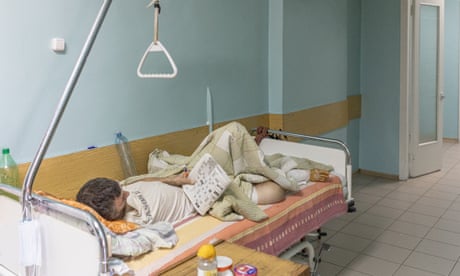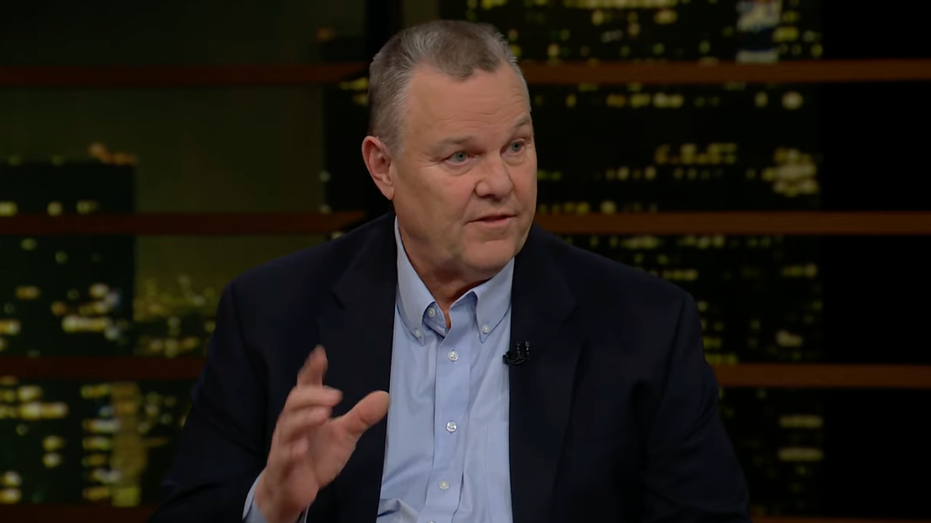- by foxnews
- 09 Mar 2025
‘There is no escape’: inside a hospital in Ukraine
‘There is no escape’: inside a hospital in Ukraine
- by theguardian
- 20 Mar 2022
- in news

Bila Tserkva's No2 hospital was emptied of patients and its cold-war-era bomb shelter filled with beds to prepare for the horror its doctors have watched overwhelm medics in other cities. The few dozen patients they have taken in since war broke out are harbingers of the storm to come.
One lost an eye to an explosion as he chatted with friends. Another faces months of recovery after a sniper bullet shattered his thigh bone. A third interviewed by the Observer was so badly wounded by a shell that forming a short sentence leaves him breathless with exhaustion.
Several were injured when a rocket hit an apartment block in the town, about 50 miles south-west of the capital, but most were hit in regions where fighting rages to the north and east of Kyiv. They were brought here because treating their injuries was extremely complicated, or because the hospitals treating them closer to the front line were under fire.
Russia's invasion of Ukraine has been marked by intense attacks on civilian infrastructure. The World Health Organization says it has verified at least "43 attacks on healthcare" - hospitals, patients, or other infrastructure - since the war began.
Nina Vasilivna, director of the hospital, says staff are getting ready for the war to arrive not just on their doorstep but in the hospital, if Russia renews its now-stalled assault on the capital. With 425 beds, it is one of the biggest in the Kyiv region, and effectively on standby.
"We only take emergency patients and war injured - all scheduled operations have been cancelled since the start of the war," she said. "There is no escape, so we have no option except to be ready."
Natalie Roberts, a British doctor working for MSF in Ukraine, said: "Like everyone else, we can't get in to besieged cities [such as Mariupol], but at least we can help prepare other places to handle these events, if and when [fighting] gets to them.
"They aren't asking us for staff the way they were in Syria. Here they are asking for knowledge - how to manage war wounded, how to manage when you get 100 patients at once, with heavy trauma injuries."
The country is well prepared in some ways, she said. It has a lot of doctors and other medical staff, most of whom want to stay in their posts.
Tania Kotsiuk, one of the nurses treating injured civilians in Bila Tserkva, said: "We can't leave because we are key workers, and we don't want to leave because we are Ukrainians."
In large cities there are several hospitals, some for civilians, others set up in a parallel military medical network.
But even for the most experienced medics, being on the front line can prove overwhelming. In Ukraine's most intense conflict areas, doctors used to having the latest diagnostic tools such as magnetic resonance imaging and laboratories, have found themselves trying to treat patients under fire with no electricity and dwindling supplies of drugs.
During a major battle, hospitals can be flooded with patients for days. Sometimes surgery must be aimed simply at keeping people alive so they can move on to other victims, rather than treating every aspect of injuries.
Roberts said: "Adapting to war is hard. In the UK you have mass casualty events like a bus crash, but it would be one or two intense days handling patients. This could go on for weeks, months, years.
"How do you deal with the fact that you don't know how long it will last? You can't use all your supplies on day one. Surgeons are used to doing full operations, but now they have to just stabilise people and hope they recover for full surgery later."
All this when their own lives are on the line; even maternity hospitals have not been spared bombing attacks, and cancer wards for children put under siege.
Apart from emptying beds and stocking up on supplies, tasks include preparing a bomb shelter that has its own power supply, ventilation and even makeshift operating theatres. Its doors, nearly half a metre thick, can be operated by a single strong man. "We have one and he has been practising all the time," Vasilivna says.
The hospital is ready; many of its medics have some experience of war after eight years fighting Russian-backed separatist forces in the country's east, but they are also aware that the scale of that conflict is dwarfed by the current attacks.
"Doctors have experience of this kind of injury because we have been fighting since 2014," Vasilivna said, on a tour of the hospital's preparations. "But this is a different war from the one we have had up to now."
- by foxnews
- descember 09, 2016
'Speaker scum' on flights sparks debate among travelers: 'This is getting out of hand'
A traveler asked social media users to weigh in on flyers who play audio aloud on their devices and don't use headphones.
read more


